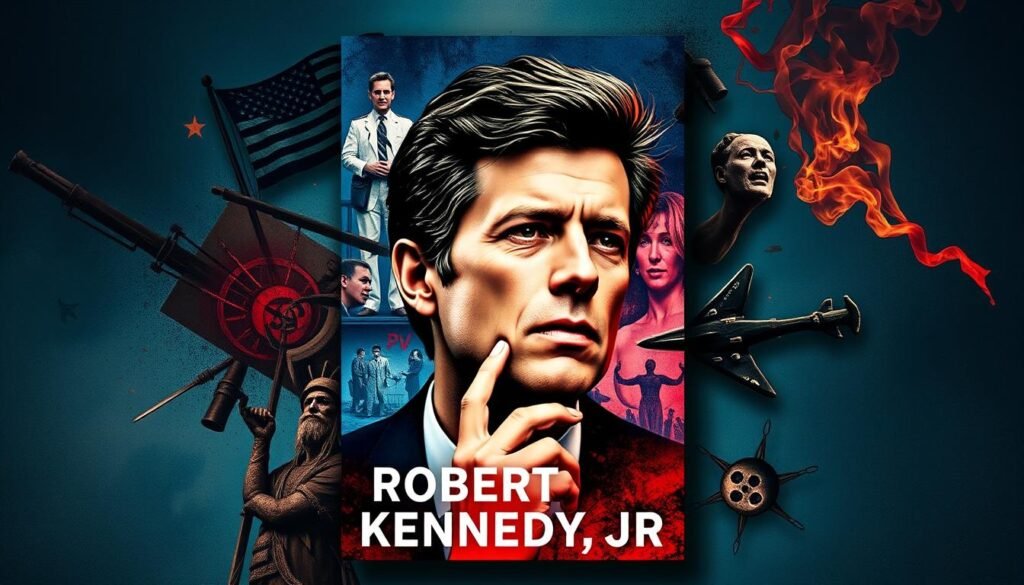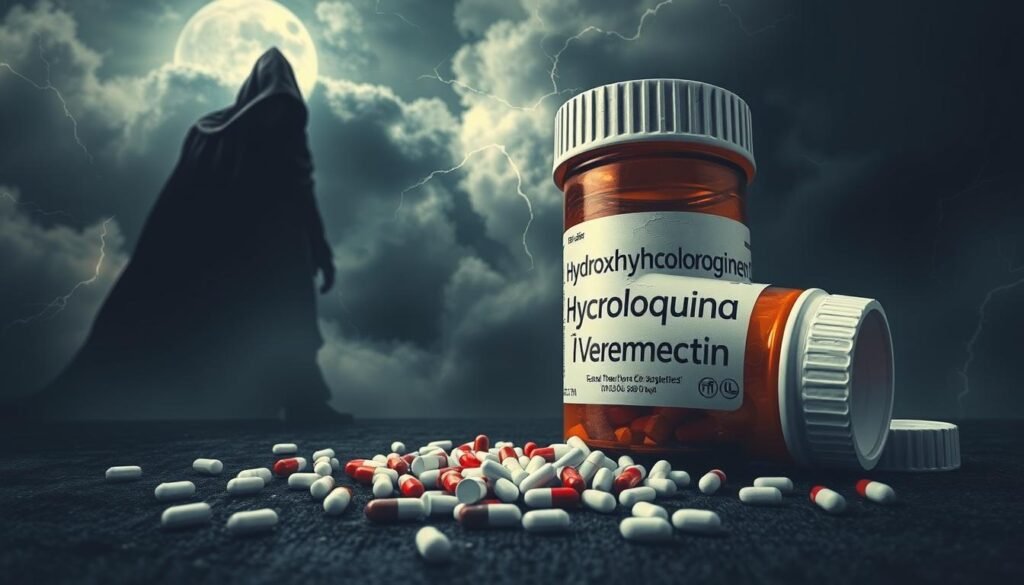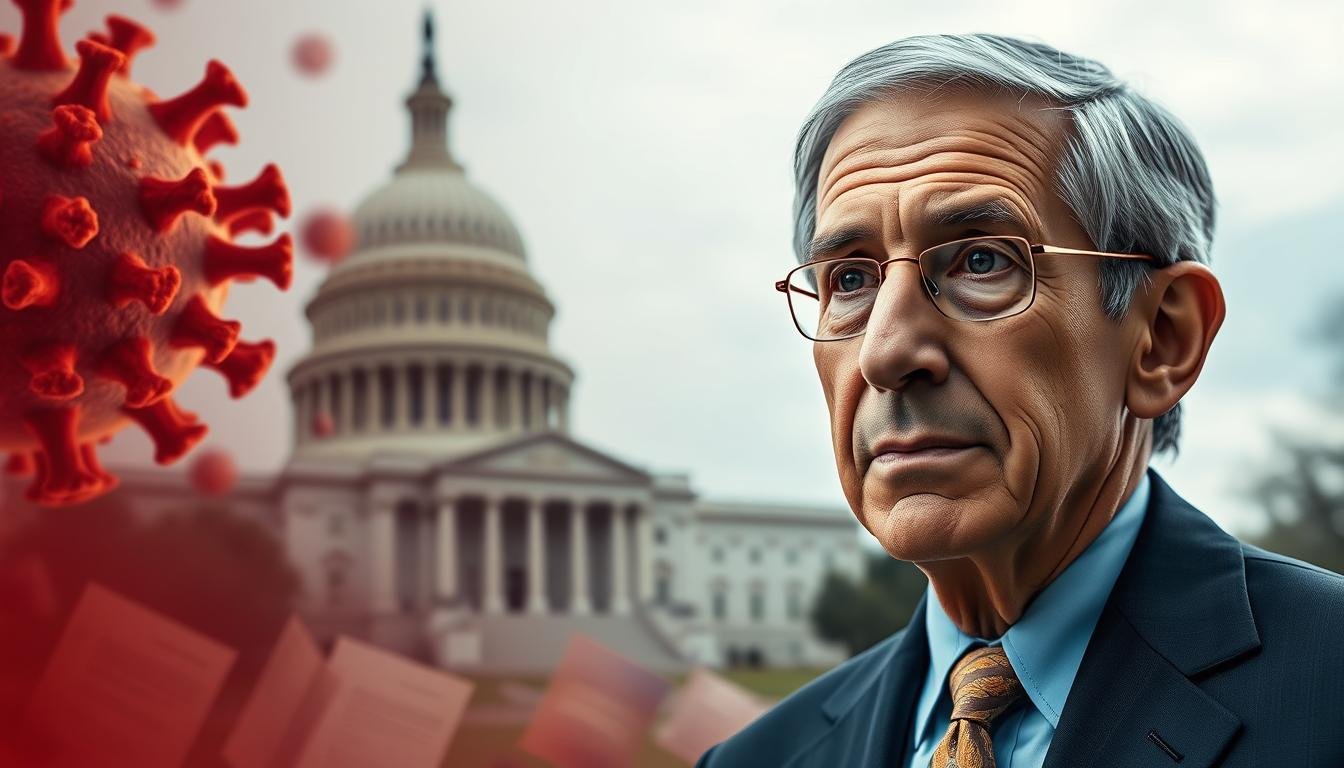In America’s public health scene, Dr. Anthony Fauci stands out. He’s key in the fight against COVID-19. His life and choices are explored in The Real Anthony Fauci by Robert F. Kennedy Jr. We look into the debates Kennedy brings up, showing the impact on health and rules.
Dr. Fauci leads with a big budget of $6.1 billion at NIAID. He’s in the spotlight a lot. Over 22 million work in healthcare in the US. His decisions reach far. Although he earns more than the President, some in New York, Massachusetts, and Georgia earn more in health and research.
Still, people have mixed feelings about him. As of December 2021, 85% of Democrats supported him strongly. But, The Real Anthony Fauci raises serious questions. It talks about his pandemic tactics, ties to Big Pharma, and science’s truth. Kennedy sees Fauci and Bill Gates as too controlling over health stories. He doubts some drug companies’ aims.
Next, we’ll explore more about Dr. Anthony Fauci biography. We’ll look into his controversial moves and connections. Our goal is to give a fair view of his impact. By doing so, we help people understand this key figure better.
Claim Your FREE Copy of “The Real Anthony Fauci” Here.
Introduction to “The Real Anthony Fauci”
Robert F. Kennedy Jr. explores Dr. Anthony Fauci’s influence in “The Real Anthony Fauci.” He looks at Fauci’s role in public health, focusing on history and the pandemic. Kennedy aims to show the issues with Fauci’s choices and their effects. The book goes deep into Fauci’s career.
Kennedy believes Fauci made big mistakes during the HIV and COVID-19 crises. He uses facts and events to criticize Fauci. He talks about secret drug tests on HIV-positive foster kids, where at least 80 died.

The book also looks at the 1976 swine flu vaccine issue. It caused over $80 million in damages from lawsuits. Kennedy covers other health scares like bird flu and Zika, showing high costs and little effect on health.
Over one million copies of “The Real Anthony Fauci” have been sold. It was a New York Times best seller for seventeen weeks. Yet, some saw it as controversial. At 480 pages, it details Fauci’s alleged misuse of power for 30 years, during HIV and COVID-19.
Kennedy’s book calls for a new look at Fauci’s legacy. It aims to make readers rethink the stories about a top U.S. health figure. The book does more than criticize; it challenges us to question familiar narratives.
Claim Your FREE Copy of “The Real Anthony Fauci” Here.
Mismanaging a Pandemic: Controversial Actions
Dr. Anthony Fauci’s pandemic response faced hard questions during a 14-hour testimony. Critics didn’t like how drugs like Hydroxychloroquine and Ivermectin were handled. The uncertainty about COVID-19’s start—natural or a lab leak—added to the debate.

A subcommittee found issues with the U.S. response after investigating for over a year. It found that federal funding for EcoHealth Alliance was stopped. They were working with a Chinese lab, which raised more questions about Dr. Fauci’s role.
Fauci pushed for Remdesivir, even though it didn’t majorly drop COVID-19 deaths. This put the spotlight on the neglect of cheaper drugs like Hydroxychloroquine and Ivermectin. People said he ignored these options despite saying science was key.
The focus on vaccines was obvious. The U.S. declared a national emergency on March 13, 2020. Just three days later, the first vaccine trials began. The fast approval of vaccines like Pfizer and Moderna showed a big move towards getting vaccinated.
The social distancing rules brought big changes. Places like businesses and schools had to close because of the 6-foot rule. Fauci later said the rule was not his idea. It also became less relevant as we understood more about the virus.
Emails from the NIAID showed they tried to dodge public records laws. This made people question how open they were being. Also, research that makes viruses more deadly was heavily criticized.
Many factors affected how the pandemic was handled. Conflicting advice and government issues were big problems. The reported deaths in Wuhan were 3,869, showing the pandemic’s wide impact.
The Relationship Between Dr. Fauci and Big Pharma
There’s a big debate about Dr. Anthony Fauci’s connection with big pharma. People talk a lot about the Anthony Fauci and Bill Gates Partnership. They say this team-up cares more about money than health.
Dr. Fauci leads the NIAID with a $6.1 billion budget. This shows he has a lot of control in health research. The vaccine market is worth $60 billion. This shows there’s a lot of money involved.
People question the Fauci and Gates team-up. They worry about how it affects health rules. From 1988 to 2002, Dr. Fauci’s NIAID did HIV trials on kids. Sadly, many died. This makes us question the ethics of these team-ups.
In 1976, the swine flu scare led to a big vaccine push. The government spent $135 million. But the flu didn’t spread much. Sadly, the vaccine caused harm. This led to over $80 million in lawsuit payouts.
“The predicted death toll from the 2005 bird flu was up to 150 million, yet actual deaths were around 100, associated mainly with comorbidities.”
Robert F. Kennedy Jr. says that pharma-backed media likes Dr. Fauci too much. He thinks this could lead to bias. He stresses that the Anthony Fauci and Bill Gates Partnership could sway global health rules. This calls for clear and ethical leadership in these partnerships.
Claim Your FREE Copy of “The Real Anthony Fauci” Here.
“The Real Anthony Fauci”: Criticism and Revelations
Robert F. Kennedy Jr.’s book, “The Real Anthony Fauci,” discusses Dr. Fauci’s role in health issues. Specifically, it looks at his actions during the HIV crisis. Kennedy believes Dr. Fauci used his position poorly, leading to negative impacts.
He is accused of exaggerating diseases and doing unethical tests on people in need. This has caused a big debate.
“Dr. Fauci has a penchant for misleading the public and manipulating data to benefit his strategic goals,” claims Kennedy in his book, sparking a significant debate among healthcare professionals.
Dr. Fauci controlled a huge budget for scientific studies. But his choices in the HIV fight are criticized. Some say he ignored quick fixes for research that took too long. Kennedy wonders if Dr. Fauci’s testing on kids and others was morally right.
The book also mentions Dr. Fauci’s work with Bill Gates. They aimed to lead a big vaccine project from Gates’ large house. This raises questions about Dr. Fauci’s true intentions.
Still, “The Real Anthony Fauci” has received lots of praise. It has a high rating on Goodreads. Despite the criticism, Kennedy’s book starts a needed talk on science and ethics in health care.
Public Perception and Media Representation
Media has a big role in what people think of Dr. Anthony Fauci during COVID-19. He’s seen differently because of this. How media shows him can make people view him in many ways. This often depends on their political views.
Studies show mixed messages in the media can make science seem less credible. Looking at 225 articles, including 75 from Fox News and 150 from CNN, shows this. CNN talks more about health risks and following Fauci. But some media can make people doubt him.
Research found things like past flu shots and age can predict who will listen to Fauci. The way media shows the COVID-19 start also changes what people think. Misinformation on social media about Fauci makes some hesitate.
Using sources that are trusted can fight false information. Even with mixed views on Fauci, showing the truth again can fix wrong beliefs. But, we need more proof to measure change. Dr. Fauci is seen as both a hero and debated due to media.
Conclusion
This book, “The Real Anthony Fauci,” has really made people talk. It sold over one million copies. It also stayed on the New York Times best seller list for seventeen weeks. The book looks closely at Dr. Fauci’s work over 30 years, suggesting he misused his power.
Many argue about what’s in the book, especially Dr. Fauci’s actions during the HIV and COVID-19 outbreaks. It talks about why the World Health Organization didn’t back hydroxychloroquine for COVID-19. Also, it questions the truth about vaccines. Yet, research proves vaccines work well against the virus.
People and scientists have different opinions on the book. Dan Wilson, a molecular biologist, made seven episodes to challenge the book’s claims. He talks about why getting science right matters. The book also looks at how lockdowns and following health rules affected us during the pandemic.
The book makes us question how much we trust health institutions. It asks us to think more about how global health policies are made. The need for honest and fair health suggestions is clear. How we handle public health from now on will surely be influenced by these discussions.

